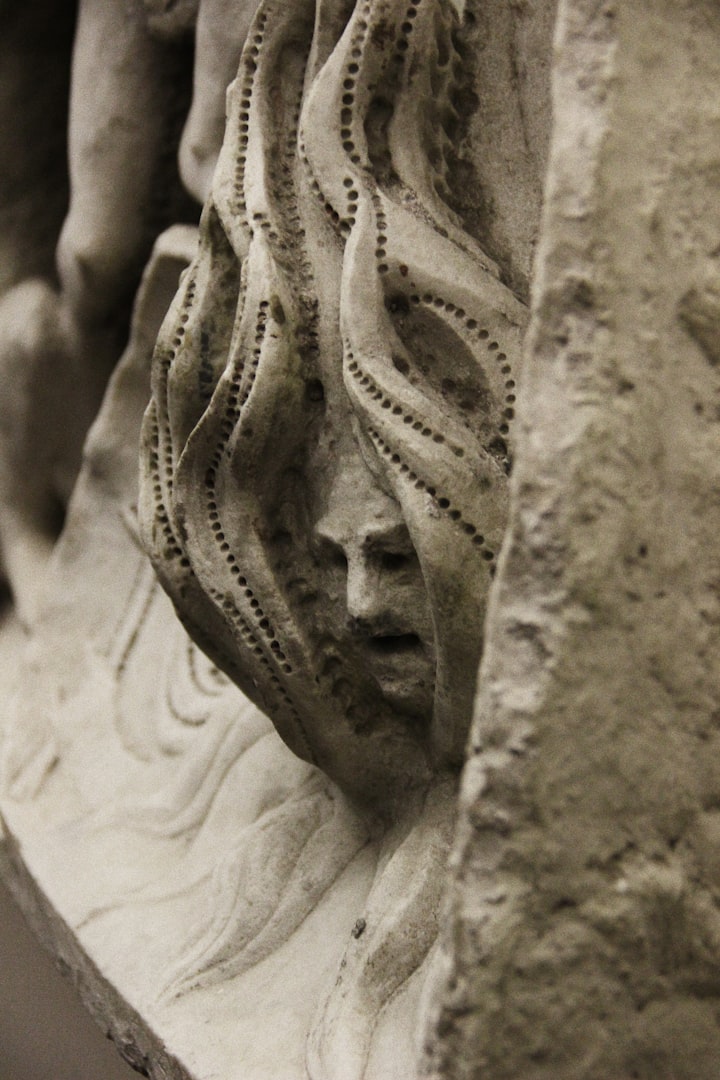The Devil on the Titanic
A chance meeting changed the course of history

My mind was steady amidst the chaos; I fairly knocked down a woman with a boy child in her arms as I bolted out to the deck, yet I took no time to right them. Instead, I grabbed a small wooden side table, one of those which framed the deck chairs that had begun to cascade across the polished teak planks.
The ship was sinking, that much was clear. And I, I could not go down with the ship. I still had work to do. I will say, I had an incredible sense of fortitude as I stood at the rail and calculated my chances. Behind me, the electric lights were flickering, forecasting impending doom. Below, far below, was the blackest water I’d ever seen. No moon to reflect its light on the surface. No land, no rescue in sight. But if I were going to survive, I would have to—
I grasped the table in both hands and charged at the rail, about to take flight. One foot caught purchase on an upturned barrel, the other carried me forward, over the side. Suspended in air, one solitary eternal moment, then I plunged deep into the pitch.
The velocity of my impact drove me perhaps 15 feet down; I kicked furiously and exhaled the seawater through my pursed lips. The table, still fast in my hands, bobbled and twisted in the frigid deep until its buoyancy corrected itself and brought us both to the surface. Success. I was alive.
The din around me was deafening. Panicked cries for help from others who’d jumped or waited for the dinghies. A low-pitched growl of the ship taking on water. A faint tinkling of music, fading in and out of earshot. The sea itself roiled a sinister song of gloom.
I held fast to my modest raft, bobbing along, then attempted to propel myself away from the mechanical carnage. My lower limbs were numb, and I willed them to work despite their lack of sensation. While I could not feel them, my legs kicked well enough to shift me a considerable distance. I knew, when her final moment arrived, she’d take everything near her as she plummeted into the depths.
From my vantage point, I waited. Waited for the final act of this glorious beast, the unsinkable, the Titan of the Sea. The miracle of iron and steel. The Titanic.
I floated. And watched, quite dumbfounded, fascination and terror as numbing as the pitch-black water washing over me.
Might I be able to reach a lifeboat? Could I climb aboard? I had to survive. I must continue my work in America. I had to discover what made them tick. It was…my calling. My handiwork was nowhere near perfect yet, and those who were fascinated by my endeavors had been waiting too long for my magnum opus, my crowning achievement.
My work in London became too dangerous to continue; the authorities were on to me, and my last attempt had to be aborted. How in Hades was I supposed to find the answers I hoped for with all eyes upon me? I was a doctor, a researcher, a fellow who should be revered. Instead, I was reviled, called a monster, a maniac. I tell you, I am of the sanest mind, saner than the King and the constables who have chased me from Whitechapel.
The sea current changed, lurched me in the direction of the sinking behemoth. I attempted to paddle further out, belly on table, arms and legs moving as fast as they could. I could not determine where sea began and sky ended; the salty seawater distorted my vision. I bumped into something…a body, no, a living being.
“Please, sir, help me…help me and my boy!” I heard a weak cry. “We’ll no doubt perish without a float of sorts.”
I peered ahead, unable to see the source of the plea.
Suddenly, a yawning groan enveloped us, knocked us together once again. Twas the Prince of Hades himself, roaring from the bowels of the sea. A loud crack, and more hellish bellows. Gravity it was, pulling the ship to the sea depths. The grand Lady Titanic was gone.
“Jimmy!”
Violent thrashes. A guttural wail. Sobs.
“Sir, my baby! I’ve lost my boy—JIMMY! Help me, I’ve lost ‘im!”
I scissored in the murk until I once again tumbled into this unfortunate woman, then enveloped my legs around her and pulled her to the table.
“Hold on!” I shouted. “It’s a table—wrap yourself around the leg and grasp hold of the top of it!”
“JIMMYYYYYYY! Oh, dear God in Heaven, I’ve lost my boy. I’ve lost my baby. My boyyyy…” her screams turned to whispered murmuring as she lost strength. I could hear her, spitting and coughing as the sea filled her mouth and nostrils.
“Oh dear God,” she whispered. “I must find him. My Jimmy.”
“My dear lady, you will surely perish if you try,” I explained to her. “Your only hope is to hold on alongside me and hope for rescue. Your child—I’m afraid your child is gone. You must concentrate on saving yourself now.”
Her sobs turned to sniffles and hiccups; her occasional gulps and coughs were the only indicators that she had not succumbed to the icy water.
An hour passed, then another. Flotsam—trunks, barrels, and odds and sods—became visible as stars popped in the sky. Very much a playhouse stage, eerily silent upon the abandonment of its plot and main players.
A few whimpers ensued, but the woman held tight. To keep her awake, I spoke to her, softly, convincingly.
“What is your name, woman?”
“’Tis Margaret, sir,” she replied. “Jimmy, Jimmy was my boy…he was a miracle, really. Nine year old, he were. I weren’t meant to have babbies…”
“Where is your home, Margaret?” I asked, attempting to engage her in conversation. “What is the reason for your passage to America?”
“Sir…”
“Yes?”
“London, sir. Whitechapel, nigh London Hospital.”
I knew the area well, had frequented it for years. The woman did indeed speak with an East End inflection.
Margaret sighed. “M’ son and me, we…I pinched and near starved to move us to New York to live with our cousin. Nothing could be wors’n Whitechapel.”
“Indeed, dear Margaret, it’s said that Whitechapel is a vicious cycle of poverty, drugs, and prostitution,” I carried on. “You must hang on, get to New York. Break the cycle, start a new life.” I paused.
“And those abominable murders…twenty years later, and they remain unsolved,” I ventured, an amused chuckle held in my throat.
“Blimey, yes,” she said. “I was a lucky one, me.”
In the inky light, I could just make out her silhouette.
“Sir…?” Margaret asked. “Sir, what did you do in London?”
“I am a doctor…a surgeon and researcher,” I told her. “I taught at London Hospital until 1899. I was quite familiar with Whitechapel and its…more colorful residents.”
“It is you, is'n' it, sir?”
“What is me, woman?”
“Give me another hundred years, and I could never forget your voice, sir,” Margaret continued. “It was you who cut me up all those years ago. Left me laying in the street, dead-like, but I weren’t.
“My boy was indeed a miracle,” she explained. “After what you done, I should’ve never been able to.”
“My dear woman, I have no idea what—”
“And now he’s gone. My boy. My life.”
“If you think I had anything to do with—”
A kick, a thrashing, the table corner met my left temple, and I lost my grasp. I reached out for the makeshift float, but Margaret kicked and paddled out of my reach.
“Margaret,” I cried. “Margaret, I’m—”
“You’re Jack!” she hissed. “You’re the Devil himself. You cannot be saved. On th' body of my Jimmy, I damn you t' hell!”
Without the device to support me, my limbs began to seize. I flailed helplessly, drawing in as much water as air. My thoughts became muddled, my brain tired. Magnum opus…ceding to failure…but…I would remain an enigma, an unsolved puzzle…immortal.
Epilogue
Margaret Kinney survived the sinking of the Titanic. Her son, James, was never found.
After her rescue, Margaret moved to New York to live with her first cousin Betty Denham and her family. When WWI began, her cousin’s husband Walter joined the war efforts. In 1916, at age 41, Margaret went to work for the Pennsylvania Railroad, maintaining the track beds between New York and Pennsylvania. It was hard work wielding pickaxes and shovels, but she enjoyed the freedom America had given her.
In 1918, Betty’s husband Walter was killed in the Battles of the Meuse-Argonne, leaving her to raise three children under the age of 12. Margaret made little money—the discrepancy between men’s and women’s salaries was significant—but she scrimped enough to help support Betty’s family. This wage disparity led Margaret to fight for women’s rights, and she became a leader within the National Women’s Trade Union League.
Margaret Kinney died in 1962, at the age of 86. She never married, but she was a beloved aunt to Betty’s three children: Mary Catherine, Robert Ivan, and Maureen Grace. My mother, Mary Catherine, named me Catherine Margaret in her honor. My Auntie Margaret never talked about being a hero, but I think it’s time her story is told.
About the Creator
Catherine Kenwell
I live with a broken brain and PTSD--but that doesn't stop me! I'm an author, artist, and qualified mediator who loves life's detours.
I co-authored NOT CANCELLED: Canadian Kindness in the Face of COVID-19. I also publish horror stories.
Reader insights
Outstanding
Excellent work. Looking forward to reading more!
Top insights
Compelling and original writing
Creative use of language & vocab
Easy to read and follow
Well-structured & engaging content
Excellent storytelling
Original narrative & well developed characters
Masterful proofreading
Zero grammar & spelling mistakes
Heartfelt and relatable
The story invoked strong personal emotions
On-point and relevant
Writing reflected the title & theme






Comments
There are no comments for this story
Be the first to respond and start the conversation.